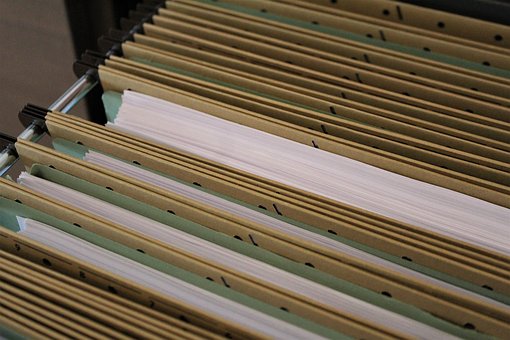This post is a follow-up to Organizing Paperwork.
Order
If you think one way, don’t organize your files another way that you will fight every single time. If you aren’t the only one using it, others will need to be taken into account too. But choose a system that makes sense. The system is key, but what works for someone else may not work for you. Think it through before you dig in.
Personal documents can be kept by area (house, church, cars, taxes, projects, finances, legal, etc.) or by person or by purpose (financial record, reference as needed, sentimental value) or simply by year. Once you have big categories, some may be so big you need to divide more.
Note: Going too far into the weeds with a filing structure can hurt you. You don’t need a file for every record — just like you don’t need an entire shelf for one book. Once the grouping is small enough to easily see what’s there or search, it’s good to go.
Once you know your sections, you can sort the contents into them. Some things make sense to file by time (like monthly bills). Other things are by topic (charitable donations). Others matter more by name (each family member’s health records). Think about how you use each unit. They don’t all have to be the same, and some don’t even need much order — just containment (remodeling ideas).
Note: Avoid weeds here too. If you only need receipts by year for a total cost, don’t take time to alphabetize them by store name.
If you are simply keeping household paperwork on a yearly basis, you can simplify even more by keeping one file drawer (or box) for current use. Whether you have files separated by account or by month, they are current and right there. Once a year is done, all the papers go into a storage box for another year or two. You can reuse the file folders or recreate them in the current file drawer. When the time is up, the contents of the storage box are shredded and then the box is reused.
Location
Where you keep stuff matters, too. Electronic files can usually be accessed on multiple devices, which makes them easy to use. If you pay bills at a desk, a drawer with file folders at hand works well. A few binders or boxes of treasured recipes in the kitchen will help with meal planning or sharing. Think about where you use the paperwork you are keeping.
Names
Labelling is key. How you will refer to it when you need it again should show up in how you label or name your file or box. If you call a file Bovines but always call the animals Cows, you will search for Cows when you need those records!
If you need to keep brown cows and spotted cows records separate, include those words in your label also. What you need to know should be easy to spot, even if that means a few words in each file name.
Consistency also matters here. If you say the same three words in three different ways, it will be hard to find all the Christmas Gift Lists because some are under Christmas, some are under Gift and some are under the individual names. The most important word goes first on the label, then sort down from there. If you only use these at Christmas, that may be it. If you sometimes use Christmas ideas for birthdays, maybe Gift is better.
Your two key questions as you organize are:
- How will I use it?
- What is most important?
When you answer those thoughtfully, you will have your main direction for keeping and sorting.

